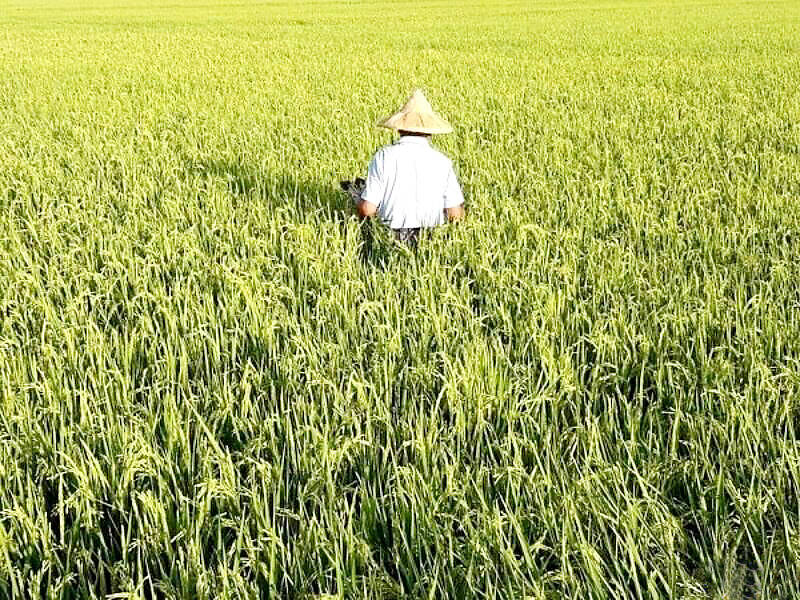The government would definitely defend the nation’s most sensitive products, Premier Cho Jung-tai (卓榮泰) said yesterday, as the 90-day pause on sweeping US tariffs is set to expire on Wednesday.
Cho made the remarks when inspecting the public grain reserve in Yunlin County’s Dounan Township (斗南) yesterday, in response to remarks by Chinese Nationalist Party (KMT) Legislator Chang Chia-chun (張嘉郡), who said she hopes Taiwan’s tariff negotiation with the US would not end up sacrificing farmers, as agriculture is the nation’s foundation.
The manufacturing and agriculture industries are the most important in the negotiations, Cho said, adding that the government has been seeking to find a balance between the two, while complying with various international standards, including inspection standards, and international trade and economic norms.

Photo: Taipei Times
The negotiations are ongoing, but the government would definitely protect the nation’s most sensitive products, he said.
US President Donald Trump on Friday said that he had signed 12 trade letters to be sent out next week ahead of an impending deadline for his tariffs to take effect.
His remarks came days before steeper duties — which Trump on Thursday said would range between 10 and 70 percent — are set to take effect on dozens of economies, including Taiwan and the EU.
The tariffs were part of a broader announcement in April, when Trump imposed a 10 percent duty on goods from almost all trading partners, with a plan to increase the rates for a select group within days.
However, he swiftly paused the hikes until Wednesday, allowing for trade talks to take place. Countries have been pushing to strike deals that would help them avoid the elevated duties.
Following Trump’s announcement, Taiwan and the US held their first direct talks about the tariffs on April 11 via video conference, and their first round of in-person tariff talks in Washington began on May 1, with a second round of in-person talks beginning on June 25.
Asked about the progress of Taiwan’s tariff talks with the US, the Executive Yuan on Friday said that Taiwan and the US are continuously negotiating on tariffs, and trade and economic issues, and it would brief details of the talks to the public at the right time.
Additional reporting by Chung Li-hua

Right-wing political scientist Laura Fernandez on Sunday won Costa Rica’s presidential election by a landslide, after promising to crack down on rising violence linked to the cocaine trade. Fernandez’s nearest rival, economist Alvaro Ramos, conceded defeat as results showed the ruling party far exceeding the threshold of 40 percent needed to avoid a runoff. With 94 percent of polling stations counted, the political heir of outgoing Costa Rican President Rodrigo Chaves had captured 48.3 percent of the vote compared with Ramos’ 33.4 percent, the Supreme Electoral Tribunal said. As soon as the first results were announced, members of Fernandez’s Sovereign People’s Party

MORE RESPONSIBILITY: Draftees would be expected to fight alongside professional soldiers, likely requiring the transformation of some training brigades into combat units The armed forces are to start incorporating new conscripts into combined arms brigades this year to enhance combat readiness, the Executive Yuan’s latest policy report said. The new policy would affect Taiwanese men entering the military for their compulsory service, which was extended to one year under reforms by then-president Tsai Ing-wen (蔡英文) in 2022. The conscripts would be trained to operate machine guns, uncrewed aerial vehicles, anti-tank guided missile launchers and Stinger air defense systems, the report said, adding that the basic training would be lengthened to eight weeks. After basic training, conscripts would be sorted into infantry battalions that would take

GROWING AMBITIONS: The scale and tempo of the operations show that the Strait has become the core theater for China to expand its security interests, the report said Chinese military aircraft incursions around Taiwan have surged nearly 15-fold over the past five years, according to a report released yesterday by the Democratic Progressive Party’s (DPP) Department of China Affairs. Sorties in the Taiwan Strait were previously irregular, totaling 380 in 2020, but have since evolved into routine operations, the report showed. “This demonstrates that the Taiwan Strait has become both the starting point and testing ground for Beijing’s expansionist ambitions,” it said. Driven by military expansionism, China is systematically pursuing actions aimed at altering the regional “status quo,” the department said, adding that Taiwan represents the most critical link in China’s

EMERGING FIELDS: The Chinese president said that the two countries would explore cooperation in green technology, the digital economy and artificial intelligence Chinese President Xi Jinping (習近平) yesterday called for an “equal and orderly multipolar world” in the face of “unilateral bullying,” in an apparent jab at the US. Xi was speaking during talks in Beijing with Uruguayan President Yamandu Orsi, the first South American leader to visit China since US special forces captured then-Venezuelan president Nicolas Maduro last month — an operation that Beijing condemned as a violation of sovereignty. Orsi follows a slew of leaders to have visited China seeking to boost ties with the world’s second-largest economy to hedge against US President Donald Trump’s increasingly unpredictable administration. “The international situation is fraught